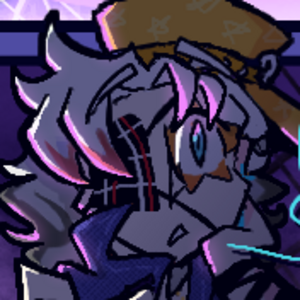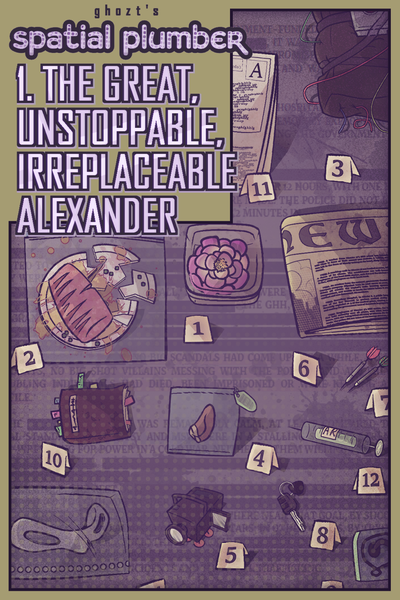The Government-Hired Heroes, shortened simply as the GHH for convenience, was a specific branch of the police born around the 12430s as an answer to the growing rise of superpowered crime; if the future of felony was in individual personalities with outstanding traits more so than in large organisations of nameless, faceless crooks, as it had appeared back then, authorities would adapt and follow suit. Originally rather small, it soon imposed itself as a signature part of the police force. As the years passed, and the GHH solidified its political importance and cultural impact, one would have expected more and more abilitied folk to flock to its doors every year; and, though, in some regards, that wasn’t inaccurate, the truth was a bit more complicated.
While back in the first few months of 12417, abilities were brand new, flashy and rare, assuring anyone who had them to be put into the spotlight, advantaged regardless of what the ability actually was, the First Supervillain crisis just half a year later proved how unstable the status of abilitied people was. Even after the abilitied revolt, Scarlet Maylis’ government and reforms, and abilities becoming an everyday thing, over the following century, this trend only worsened. The GHH had more stories wherein everything went wrong than of normal, successful heroes, it seemed. The truth was, the media simply made more noise for those trashy tales, but that was enough to stain the GHH’s reputation. And it all had started with its inception.
Scarlet Maylis, or the iconic “magical girl” Bleeding Heart, generally seen as the de facto leader of the First District, a movement spawned in response to the First Supervillain discourse to offer the discriminated abilitied an outlet, and that had eventually grown to carry out a full-on coup d’état, defending the rights of her kin all throughout the country, had gradually grown more and more extreme in her views once put in charge of the government. While many still remembered Bleeding Heart, and that cute little cheerleader chant - “B, L, E! E, D, I! N, G, ♡!” - fondly, her role as a quasi-dictatorial leader was controversial, splitting the public opinion to this day. And the Government-Hired Heroes, born under her jurisdiction, were stained with a similar reputation. One of the first big GHH controversies was that of Adrian and Luna Maylis, Scarlet’s own children and some of the first-ever GHH heroes, enrolled in their youth and who’d both run away from that responsibility before they’d even hit their coming of age - sixteen years old. Though they both eventually returned and enrolled back into the force after all just a few years later, the damage was done.
But besides the GHH and its leaders’ own faults, heroism just didn’t have as favourable an image as many other jobs. As a result of Maylis’ politics, abilitied folk had become the majority; it was no longer a standout category that ensured you an edge others didn’t have on the job market. Plus, heroism didn’t pay all that well, and the interviews were infamous for being especially harsh. Many parents therefore advised their offspring against pursuing such a career, and even if many GHH-philes still enrolled by dozens into the GHH, it found itself short on staff by the turn of the century.
The government needed to find a way to solve this. While heroism itself was in deficit, the capital’s culture, tourism and advertising depended on its theatrics. They had to make heroism more appealing, to stop abilitied people from picking other careers, or worse, using their abilities for crime and further overworking the GHH. Investing remarkably high amounts of money, they came up with an eccentric solution : hero schools.
Entirely government-funded, they were free, well-furnished schools that, on top of teaching typical subjects, promised to raise children into the GHH-compliant heroes they were always meant to be. In other words, they were free schools that ensured a stable, guaranteed job to anyone who passed with decent honours, right upon graduation. Heroes, vigilantes and villains had always been most popular amongst children; to them, there was a certain prestige to attending such a school, which made them brag about it to their friends and peers, who in turn whined to their parents to let them attend as well. Add in a few meaningless advantages and coupons, and the formula was complete; not only that, it was successful.
The GHH went from accepting any old resume that still dared come their way to reaffirming its cutthroat reputation as a prestigious organisation; it seemed nearly impossible to be hired for one who hadn’t graduated from a hero school. The two institutions grew almost indissociable over time; The hero-school grading system - C, B, A, S - became a standard of the GHH itself, which now categorised its numerous employees in the same way; C rank, B rank, et cetera. These ranks were made public as well, as fans loved to tier and compete, and reflected a difference in workload, work ethic and efficiency expected from different heroes, as well as the way they were treated. Salary, leniency of their superiors, general authority within the workplace; a bonafide hierarchy formed between employees that, on paper, shared the same contracts and jobs.
The rankings became more and more central to the GHH’s inner workings over time, and would determine things such as which heroes were paired up together; Bs with Bs, As with Cs, and Ss by themselves. In other words; As got to boss Cs around, Ss had private offices, and Bs did most of the work on their own. There were exceptions - the Golden Trio was allowed to work together, thanks to the influence of Bonnie’s family - but they were few, and didn’t change the overall situation.
The inequalities leaked out of the GHH’s walls, spreading to the capital as a whole. Non-abilitied folk, who had already become a minority, were now further disadvantaged; while, technically, one was not required to have an ability in order to be hired by the GHH, as that would’ve legally counted as discrimination, it was indeed a requirement in order to be enrolled into hero school, as that legally counted as a necessary credit. Thus, non-abilitied kids would often be shunned by their classmates, or even their own parents.
Still, it wasn’t as though every kid wanted to pursue that career path, nor like every parent was willing to support such a choice. Many abilitied people still led typical studies; such was Neville Elire Schifozzo. Born to a lower-middle-class family, he had no interest in heroism; he’d attended public education, been taught plumbing, and worked as a plumber from age sixteen to age thirty-two, married and divorced. Somewhere along the way, he’d longed for something else. Something more. Anything, maybe. Or something specific. Either way, that desire had led him to the GHH. But how could he hope to be hired given his education? Simple: His ability.
Though it looked like simple teleportation at first, it was completely different, and unlike anything that had ever been seen before. Manipulating space was as close to reality warping as abilities had gotten since the death of Providence, a sister-in-arms of Scarlet and the rest of the First District, who had the ability to manipulate events, people, probabilities and their consequences themselves. While nothing as all-encompassing as that, Spatial Plumber’s ability was still leagues above average, with endless potential for defence, offence, sneaking, information-gathering and all other purposes. And yet… his unwillingness to speak up about it and lack of proper experience in the heroism field landed Neville at a solid B. Thus, he ended up teaming up with another B ranking hero: Bubblegum.
She was what Neville had been looking for. Not in any romantic sense, but more generally, in his life. She had the spunk, the energy, the optimism that he had lost, if he ever had it. She quite simply lit up his life. She liked his company too; he was entertaining, honest, simple, and polite. Their friendship was clear to see in how they worked together. Something tied that quiet, unassuming man and that loud charismatic girl together, whatever it was. Maybe that was why they would both, separately, end up quitting the GHH to do their own thing.












Comments (0)
See all